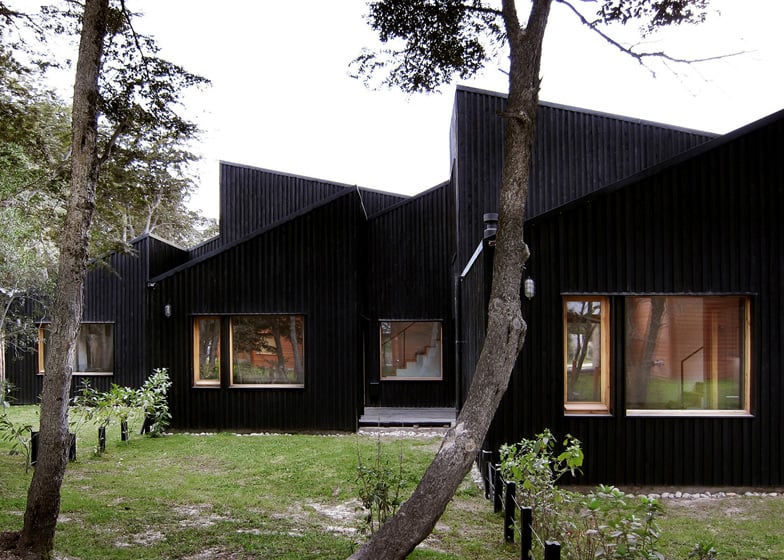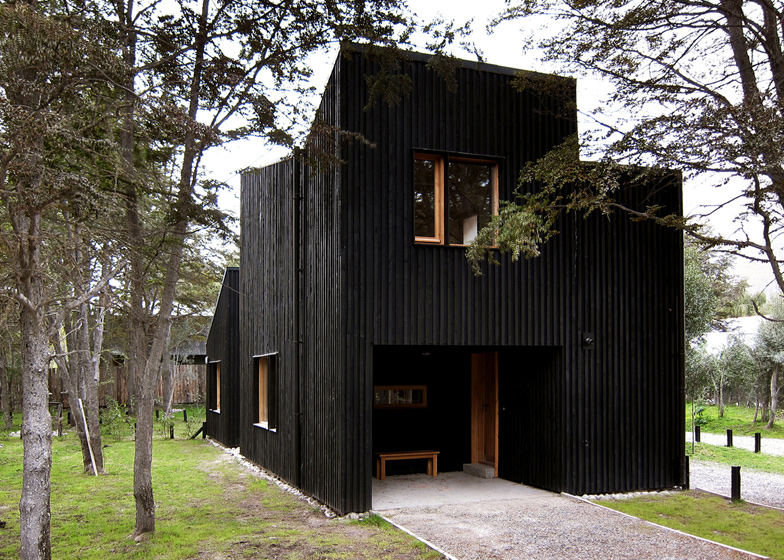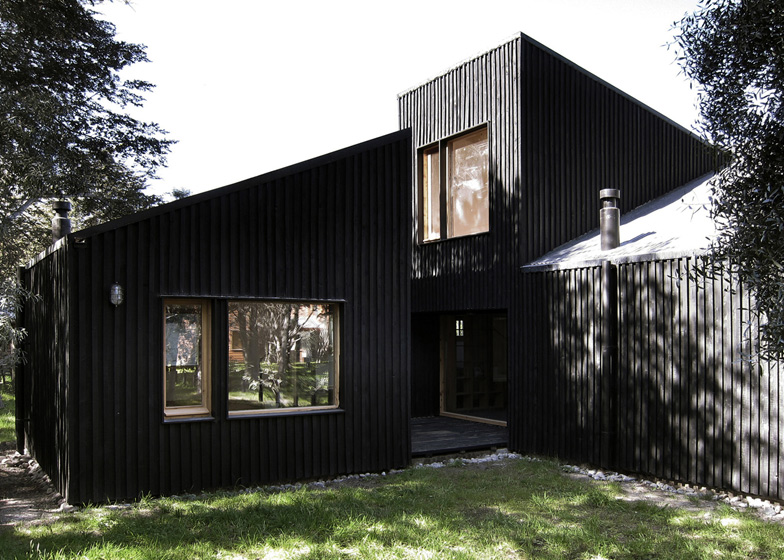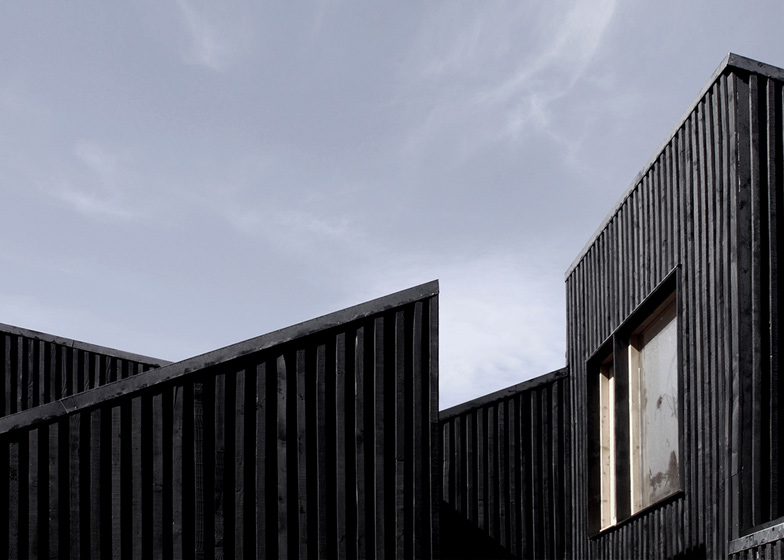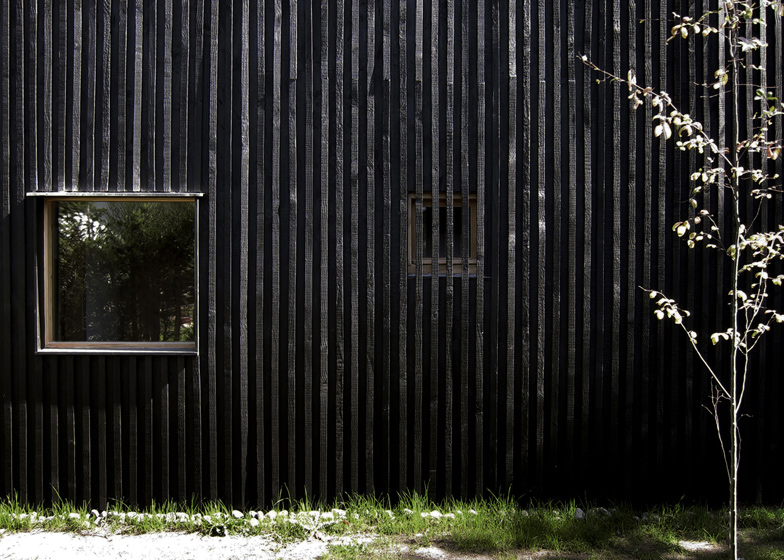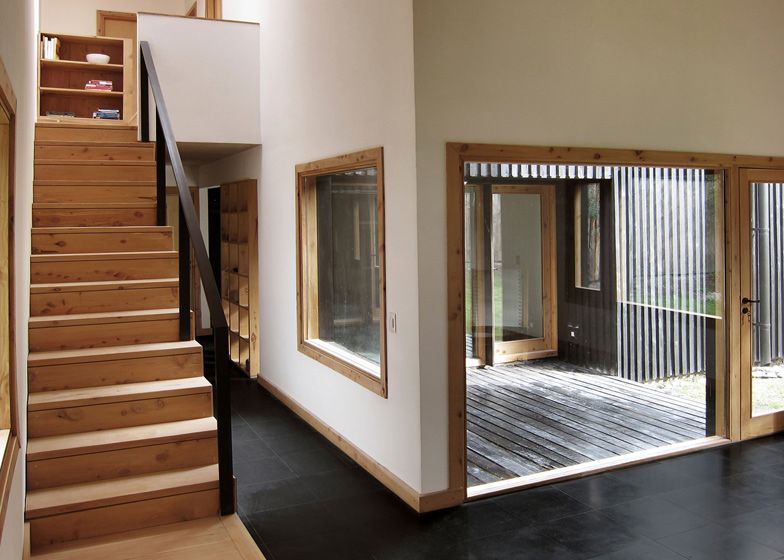Architects Estudio BaBO clad these three wooden houses in Patagonia, Argentina, with black-painted cypress so that they would look "as monolithic as possible" (+ slideshow).
"Some of the traditional wooden houses of the area are painted black, and we tried to replicate that effect," architect Francisco Kocourek told Dezeen.
All three houses have pine frames and wooden walls, and only the roofing is metal. "We used to live and work in Norway where building entirely with wood is quite common," explained Kocourek.
The rectangular houses are joined to one another, but are staggered to frame outdoor spaces at the front and rear.
Intersecting angled roofs disguise the boundaries between the different dwellings and create sloping ceilings in some of the rooms.
Entrances are located beneath recessed porches, which give each house a partially sheltered driveway.
More cypress wood can be found inside the houses, where it is used for flooring, skirting boards, doors and window frames.
Ground-floor living rooms and kitchens face each other across small, partially covered patios that are walled on three sides and open out to the gardens.
Upstairs, bedrooms and bathroom sit beneath the slanted ceilings, which are covered with chunky chipboard.
Located in a neighbourhood sparsely populated with detached houses, the units were built according to new planning regulations instated to encourage row houses.
Other projects clad in blackened wood that we've featured include a pointy gallery and studio in Japan and a sauna that can be towed like a sled.
See all our stories about blackened wood »
See all our stories about Argentina »
The information below is from the architects:
CLF Houses
The project is located on a plot along a low density residential street in the neighborhood of “El Once”, approximately 400 meters off the principal boulevard of Villa La Angostura. In spite of its apparent centric location, there is a predominance of small isolated and unaligned single family houses, empty “urban” plots and large private properties. In addition to these characteristics you will find the compacted rubble of the street, the absence of sidewalks, urban furniture and light points and the great profusion of trees give the area an unstructured and open character. A recent change in the regulations was made to modify this situation. The goal is to achieve a higher density in the area, without intention of creating an urban street section, by encouraging the construction of new row houses. This change comes with a very strict set of rules regarding the choice of materials, the use of colors in the facade and the angles of the roof.
Isometric diagram
The assignment was to design and build three units of row houses, each one of two floors. The program consists of a living room, dining room, kitchen, toilet, and laundry room on the ground floor and two bedrooms and a complete bathroom on the upper floor. A patio is incorporated in each of the units to enrich the visual connections and to open up the ground floor. It also allows a solution for the heights in the project to satisfy both the program and the regulations. The decision is also taken to step the units linearly freeing one of the sides of the patio. These operations guarantee a greater and more homogeneous natural lighting of the units and allow the visual impact of the project and its immediate environment to be minimized. Indirectly a greater privacy in the garden expansions is achieved, and the visuals from the living rooms are controlled. Volumetrically the project is articulated to be understood as one unit. The inclined planes of the roofs link the units together and the walls are understood as a result.
Ground floor plan - click above for larger image
One of the challenges presented was to build the whole project entirely of wood, including the structure and all enclosures and finishes. Despite the profusion of wood as a material in the south of Argentina, the lack of specialized knowledge and of a specialized industry narrow its uses to isolated structural elements and interior and exterior finishes, often presenting pathologies caused by their poor implementation. An integral system used in Norway based on the indications and experience of the “Norges Byggforskningsinstitutt” (Research Institute of the Construction of Norway) was chosen for the project. The system was adapted to the climatic (higher temperatures, more intense rain, less accumulation of snow), the physical (need for calculating seismic proof structures, different types and quality of wood) and human (unskilled labor, need to assemble a workshop under construction) reality of Argentina.
First floor plan - click above for larger image
The system is based on a structure entirely made of wood which extends to its wooden finished facade. Between the layers a contiguous, controlled air chamber the constant ventilation of the wood is guaranteed, keeping it from rotting, prolonging exponentially the life of the project and the materials. The system also ensures a continuous and substantial layer of insulation, avoiding any cold bridges and providing high interior comfort and energy saving. The windows are solved with double glazing. The heating in the project is solved with a combination of a radiant floor and a strategically located, high-performance salamander. The material palette and colors are reduced to a minimum of black, white, wood and metal. The facade is made of cypress painted black and the separation of the planks is based on the module of the metal plate covering the roof. All interior walls are white, the floors are made in black granite on the ground floor and parquet made of cypress on the upper floor. All the rest of the woodwork is made in natural cypress.
Cross section - click above for larger image
The objective was to analyze and understand the potential of this type of program and the different typologies regarding their placement and appropriation of the land and the resolution of the spatial relationship established between the different units. The approach to the materialization of the project from the details and from the adaptation of a constructive system borrowed from a different background was a unique consequence of the desire to use local materials. For this the application of the system on the site had to be carefully considered in order to be able to transcend the abstraction of our drawn intentions.
Type: Row houses
Architecture: Estudio BaBO
Team: Francisco Kocourek, Francesc Planas Penadés, Marit Haugen Stabell
Collaborators: Marcos Buceta
Construction: Arq. Francisco P. Kocourek
Structure: Ing. Julio C. Pacini
Location: Villa la Angostura, Neuquén, Argentina
Plot Area: 1040 m2
Built Area: 310 m2
Project Year: 2009
Construction Year: Jan 2010 - May 2011

